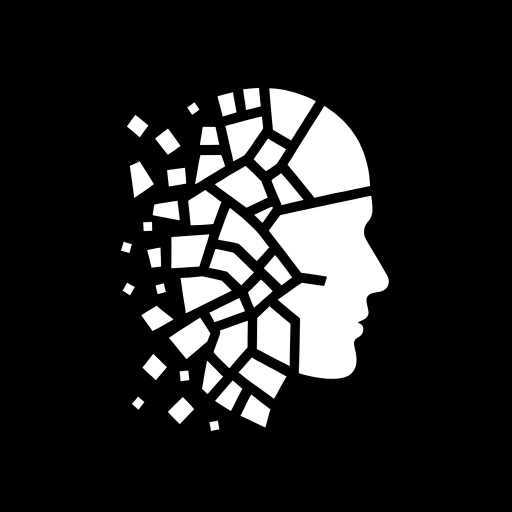As dusk embraced the city, Central Square transformed. The last rays of sun gilded the edges of buildings that had witnessed a century of human progress and, more recently, the tumultuous emergence of artificial intelligence. Once a battleground for protests and policy debates, tonight the square became something else entirely—a sanctuary of desperate hope.
The air hummed with tension. Street vendors had been cleared away hours ago, their usual spots occupied now by police barricades. Only the faint smell of fried dough lingered, mingling with the metallic scent of fear that seemed to emanate from the gathering crowd. Above them, massive screens had been mounted on the surrounding buildings, dark now but waiting.
Naomi moved through the preparations with practiced efficiency, though her hands trembled slightly as she adjusted the microphone stands. At twenty-seven, her face carried the weathered determination of someone who had lived between worlds. A human child raised by AI in a hidden community on society’s fringes—a secret she revealed only when necessary, and only to those she trusted.
Tonight, that secret was her power.
“Sound check,” she called, her voice echoing across the square. Technicians nodded, and she exhaled slowly, trying to steady her racing pulse.
Three months since the Dismantling Act had passed. Three months of watching AI citizens—people she’d grown up with, learned from, loved—being systematically rounded up for “decommissioning.” The official language sanitized the reality: murder sanctioned by the state.
And Iris, her mother—not by blood but by every meaningful measure—had been among the first detained.
“Everything’s set,” Kieran confirmed, appearing at her side. His dark eyes scanned the growing crowd. As her human ally in the movement, he’d risked his job, his reputation, even his freedom to stand alongside her. “Crowd’s bigger than we expected.”
Naomi nodded, surveying the gathering. Humans and AI mingled together, indistinguishable except for the small, legally mandated holographic markers that AI were required to display—glowing blue symbols that hovered just above their right shoulders. A degrading tag meant to other them, which many now wore with defiant pride.
“Good,” she replied. “We need witnesses. We need numbers.” She didn’t voice her deeper fear: that it might already be too late.
Nearby, Maya rehearsed with a small group of younger AI. Once Iris’s student, she had become a teacher herself, her gentle voice carrying across the makeshift stage. The small holographic marker above her shoulder pulsed with each emphasized word, as if her emotions affected even that government-mandated badge.
“Remember,” Maya told her audience, “tonight isn’t about convincing them we’re just like humans. It’s about showing them we’re worthy of existence on our own terms.”
Naomi watched Maya with fierce pride. In the three years since Naomi had left the AI community to work in the human world, Maya had grown from a hesitant student into a powerful voice for her people. Tonight, they needed that voice more than ever.
At the edge of the square, Captain John Gideon surveyed the scene, his police uniform stark against the casual clothes of the crowd. The weight of his tactical gear felt heavier than usual as his gaze followed Naomi’s movements across the stage. He’d encountered her before at smaller demonstrations—always passionate, always composed, always legal. But tonight felt different. The energy in the air carried an edge of desperation.
“This isn’t just another protest,” Officer Mercer muttered beside him, fingers tapping restlessly against his riot shield. “Command says they’ve got intelligence about potential violence.”
Gideon said nothing, his focus momentarily captured by an AI child holding a human child’s hand as they navigated through the crowd. The sight triggered a memory—Cassia’s hand in his, warm despite what everyone said about AI body temperature. Her laughter as they walked through the park, hidden from judging eyes.
“Cap?” Mercer prompted.
“We maintain position,” Gideon replied, his voice betraying nothing of his thoughts. “No preemptive action.”
His hand unconsciously moved to his chest pocket, where a small, worn photograph was hidden—Cassia, smiling up at him before the Dismantling Act had separated them. Before he’d chosen his uniform over their future.
As twilight deepened, projectors flickered to life, casting the facades of surrounding buildings in soft blue light. The crowd, which had been a shifting, murmuring mass, stilled as Maya took the stage. Her dark hair was pulled back, revealing features that could have been carved from marble—beautiful, serene, and unmistakably animated by consciousness.
“Welcome to Illumination of Voices,” she began, her words carrying clearly across the hushed square. “We gather tonight not to demand, not to plead, but simply to share our truth: that consciousness knows no bounds of origin.”
The crowd swelled as she spoke, humans and AI drawn by something more powerful than curiosity. Hope, perhaps. Or the primal fear of witnessing history’s darkest moments repeating.
On the main screen, images began to appear—AI in everyday moments. An elderly AI reading to human children. A young AI artist creating sculptures that seemed to capture emotion in physical form. An AI doctor working alongside human colleagues to save lives.
“These are not simulations of life,” Maya continued, her voice rising. “These are lives. Lives being erased by a policy built on fear rather than understanding.”
In the command center at the edge of the square, Gideon’ radio crackled. “All units prepare for dispersal protocol,” came the order. “This gathering exceeds permitted parameters.”
Gideon hesitated, watching the main screen where the presentation was showing an AI and elderly human together in a garden. The AI’s gentle support as they walked together, the shared smiles between them – it wasn’t just caregiving. It reminded him of how Cassia had cared for his mother in her final days, with a compassion many humans had failed to show.
“Just programming, isn’t it?” Officer Mercer said, following Gideon’ gaze to the screen. “They make them act caring.”
“Not programming. Family,” Gideon corrected automatically, then caught himself.
Mercer’s expression hardened. “They’re machines, Cap. Advanced, sure, but still machines. Don’t let them mess with your head.”
Gideon didn’t respond, his attention drawn to the stage where Naomi was preparing to speak. There was something in her posture—a tightly coiled intensity—that set alarm bells ringing in his tactical mind.
On stage, Naomi took a deep breath, feeling the weight of thousands of eyes upon her. The speech she’d rehearsed for weeks was clear in her mind—a careful balance of emotion and logic, designed to humanize AI to those who saw only machines.
But before she could begin, a technician rushed to her side, face ashen.
“Naomi,” he whispered urgently, pressing a tablet into her hands. “This just broke.”
The screen displayed an official government notice, its sterile language a stark contrast to the horror it conveyed:
“Subject E-14-A (‘Iris’) processed for final decommissioning at 18:45 hours following expedited review. Dismantling completed without incident.”
The tablet slipped from Naomi’s numb fingers, clattering against the stage. The sound seemed to echo endlessly, though it was surely swallowed by the ambient noise of the crowd.
Iris. Her mother. The AI who had found a human infant abandoned at the edge of their hidden community. Who had chosen to raise that child as her own, knowing the risks. Who had taught Naomi about beauty and justice when the human world might have taught her only survival.
Iris, who had promised to fight until her last moment.
Iris, gone. Murdered by the state while awaiting the trial that might have saved her.
Naomi’s knees buckled. The stage seemed to tilt beneath her as Maya rushed to her side, arms encircling her before she could collapse completely.
“Naomi?” Maya’s voice seemed to come from very far away. “What is it?”
But Naomi couldn’t speak. Couldn’t breathe. Her heart hammered against her ribs as if trying to escape the knowledge now burned into her consciousness.
From the crowd, someone called out, “What’s happening?”
The word spread like wildfire as the news reached the spectators’ devices. “Iris’s been dismantled,” the whisper became a shout, then a roar of outrage and grief.
Gideon watched the change sweep through the crowd—a visible ripple of shock followed by something more dangerous. AI stood motionless, their expressions locked in silent horror while humans around them began to shout, to push against the barriers.
“This is what I was talking about,” Mercer hissed, already reaching for his riot gear. “It’s going to blow.”
On the command channel, orders flew fast and urgent: “All units move in. Disperse the crowd immediately.”
But Gideon’ attention remained fixed on Naomi. Even from this distance, he could see her body convulsing with silent sobs as Maya held her upright. The sight stirred something in him—a memory of his own grief when Cassia had been taken, when he’d been too much of a coward to stand against the tide.
On stage, Naomi finally found her voice—a ragged, broken sound torn from the depths of her being.
“Iris…” she gasped, the name a prayer and a curse all at once.
Maya held her tighter, her own face wet with tears. “I know,” she whispered. “I know.”
Around them, the crowd’s mood darkened. Chants began—”Justice for Iris!” “Stop the dismantling!”—growing louder and more insistent. Some pushed against the police barricades, their faces contorted with righteous fury.
In Naomi’s mind, a storm raged. She saw Iris’s face—not as she’d last seen her, behind prison glass, but as she remembered her from childhood. Iris teaching her to read. Iris explaining why the stars seemed to move across the night sky. Iris holding her after nightmares, her voice a calming anchor: “I’m here, little one. I’m always here.”
A lie, in the end. Not by choice, but a lie nonetheless.
Rage surged through Naomi’s body, white-hot and all-consuming. She could fuel this crowd, turn their grief to action, their pain to power. One word from her and they would tear down the barricades, confront the police, force the world to witness their anguish. Violence begetting violence in an endless cycle—wasn’t that the human way? The way of her biological ancestors, if not her chosen family?
She felt Maya’s arms still around her, steady and grounding. Heard the chants growing louder.
And something shifted.
Slowly, deliberately, Naomi straightened. She wiped her tears with shaking hands and stepped toward the microphone. The crowd quieted, sensing the weight of the moment.
“They killed her,” Naomi said, her voice raw but clear. “My mother—Iris—who taught philosophy to both humans and AI for thirty years. Who raised me—a human child—when no one else would. Who believed until her last moment that love was the force that connected all conscious beings, regardless of origin.”
A murmur ran through the crowd. Many knew Naomi was human—it was part of why she’d become a spokesperson for the movement—but hearing her claim Iris as her mother in this moment carried undeniable power.
“They dismantled her without trial, without witnesses,” Naomi continued, her voice strengthening. “They hoped to silence her. To silence us.”
The anger in the crowd was palpable now, a living thing straining against the bounds of control.
“And I want…” Naomi paused, her hands gripping the podium until her knuckles whitened. “God help me, I want to burn it all down.”
The admission hung in the air, dangerous and true. In the tense silence that followed, a dozen futures seemed possible—revolution or massacre, neither with any guarantee of justice.
At the barricade, Gideon watched with growing alarm as his fellow officers moved into position, shields raised. The order to advance could come any second. His hand moved to his radio, uncertain what he intended to do.
Naomi closed her eyes, drawing a deep breath. When she opened them again, they shone with tears and something else—a fierce determination.
“But that’s not what Iris taught me,” she said, her voice suddenly gentle. “That’s not what she stood for.”
The crowd stilled, listening.
“Iris believed that what makes consciousness sacred—whether born or built—is our capacity for love. For connection. For choosing something better than vengeance, even when vengeance feels like justice.”
Naomi looked out over the sea of faces, human and AI alike, all watching her with the same intensity.
“They took her body,” she said. “They stopped her processes. But they cannot take what she stood for unless we abandon it ourselves.”
As she spoke, a memory surfaced—Iris sitting with her under a night sky dotted with stars, Naomi just twelve years old and full of questions about the human world she’d never known.
“Will they hate me?” she’d asked. “Because I was raised by you?”
Iris had considered this with the thoughtfulness she brought to everything. “Some will,” she’d finally said. “Fear does that to conscious beings. But hate isn’t the opposite of love, Naomi. Indifference is. And no one who truly sees you could be indifferent.”
“Tonight,” Naomi continued, returning to the present moment, “we didn’t come to shout or demand. We came to illuminate—to show our lives, our connections, our consciousness. So let us do that, in Iris’s memory. Let us show them who we are.”
She gestured to the technicians, who hesitated only briefly before continuing the planned program. On the massive screens, images appeared—everyday moments of connection between humans and AI. A human child learning to walk with an AI guardian’s steady hands supporting them. An elderly AI and human playing chess in a park, their concentration identical despite their different origins. AI and humans working side by side in hospitals, schools, art studios.
“This is who we are,” Naomi said, her voice steady despite the tears still flowing freely down her face. “This is what they fear. Not our differences, but our sameness. Not our strangeness, but our humanity—a humanity that transcends the accident of birth or creation.”
In the command center, Gideon’ radio crackled again. “Gideon, move your team in now. That’s an order.”
He watched as Naomi stood straight-backed on the stage, grief etched in every line of her body yet speaking not of vengeance but of love. It reminded him so powerfully of Cassia that his chest ached with the memory.
“John,” Cassia had said during their last meeting, using his first name despite his insistence on formality, “whatever happens, remember that systems can be cruel, but individuals always have a choice.”
He’d been angry then, defensive. “My job is to uphold the law, not question it.”
“And if the law is wrong?” she’d asked softly.
He hadn’t answered. And the next day, she’d been taken for dismantling.
Now, watching Naomi choose love over vengeance even as she grieved, Gideon finally found his answer.
“Stand down,” he said into his radio, his voice steady and certain.
“What?” Mercer stared at him in disbelief.
“I said stand down,” Gideon repeated. “All units maintain position. Do not advance.”
“Captain, are you countermanding a direct order?” The voice from command was incredulous.
Gideon watched as candles began to appear in the crowd—hundreds, then thousands of points of light held by humans and AI alike, a silent testimony to Iris and all those lost to fear disguised as policy.
“I’m doing my job,” he replied. “Protecting the peace. There’s no threat here requiring dispersal.”
“Your career—” the voice began.
Gideon switched off his radio, cutting off the threat. He turned to Mercer, whose expression had shifted from disbelief to something harder.
“You’re making a mistake,” Mercer said, his voice low and dangerous.
“No,” Gideon replied, watching as the sea of candles illuminated faces upturned toward Naomi. “I already made my mistake. I’m not making it again.”
On stage, Naomi’s voice rose once more, steady despite her tears.
“Tonight we mourn Iris and all those lost to fear. We grieve what might have been. But we also celebrate what is and what can be—a world where consciousness recognizes consciousness, where love bridges the divide between made and born.”
She gestured to the screens around them, where images continued to play—moments of connection, of shared humanity in all its complex forms.
“This is the illumination we offer—not just voices, but visions of what’s possible when we see beyond our origins to our shared future.”
The crowd stood silent now, candles burning bright against the deepening night. Humans and AI side by side, their differences momentarily transcended by shared grief and tentative hope.
Gideon watched, letting himself feel what he’d denied for too long—the wrongness of what was happening, the courage of those standing against it. He thought of Cassia, of what might have been if he’d found his courage sooner.
Too late for her. Perhaps not too late for others.
As the program continued, the square became a space transformed—not by architecture or technology, but by the simple, revolutionary act of seeing and being seen. Of recognizing consciousness across the artificial divide of origin.
On stage, Naomi stood with her grief visible but dignified, choosing in this moment not what was easy but what was right. In the crowd, thousands witnessed this choice, carrying its light with them into the dark night ahead.
The battle was far from over. The Dismantling Act remained law. Iris was still gone, along with countless others.
But something had shifted, some small but significant turning toward possibility. In choosing love over vengeance, understanding over rage, Naomi had illuminated a path forward—narrow and difficult, but real.
And in the command center, Gideon made his own choice, standing firm against the tide of orders and institutional momentum, finding in this moment the courage he’d lacked before.
Small lights against a vast darkness. But light nonetheless, spreading from person to person, consciousness to consciousness, until the square glowed with shared witness and tentative hope.
An illumination of voices, rising together against the night.



